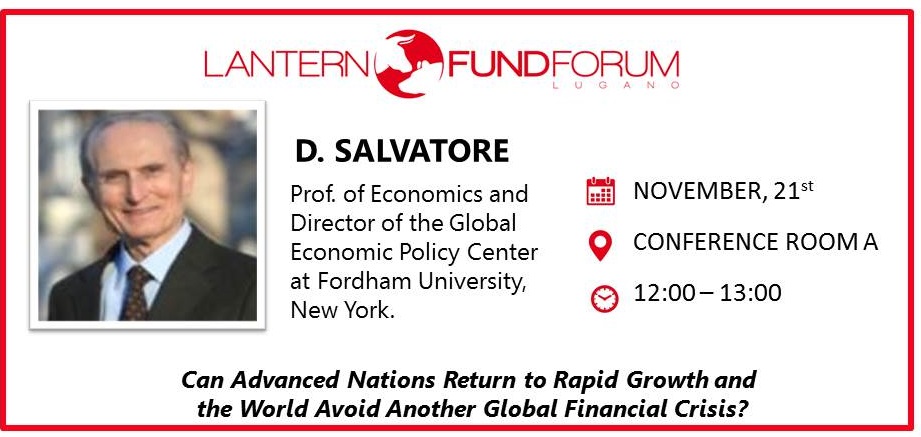Dominick Salvatore at Lantern Fund Forum in Lugano

Can Advanced Nations Return to Rapid Growth and the World Avoid Another Global Financial Crisis?
After six years from the end of the deepest global financial crisis of the postwar period, growth continues to be slow and uneven in advanced countries and falling in most emerging markets. There is even the risk of the world drifting toward a new global financial crisis.
The presentation will examine the dramatic economic events and the crucial financial challenges that the world faces at this juncture. These are: (1) the slow recovery and uneven economic growth in the advanced countries after the recent global financial crisis, (2) the recent dramatic slowdown in the rate of growth in emerging markets (especially in China) and recession in others (such as Brazil and Russia).
Specifically, I will examine the prospects and policies for (1) the United States to go back to its pre-crisis higher rate of growth and for Europe and Japan to avoid deflation and stagnation, (2) China to succeed in restructuring its economy from manufacturing and exports to services and consumption without a further sharp decline in its growth rate, and (3) Brazil and Russia to overcome recession and return to rapid growth, India to continue to growth rapidly in a world that has been slowing down.
Also, are very low or negative interest rates creating a new financial bubble that could lead to another global financial crisis? Could an increase in the Fed policy rate lead to a collapse of stock markets in advanced nations and a reversal of the recent capital inflows into emerging markets? What will be the economic and financial effects of "Brexit" on the United Kingdom and the European Union? Can Switzerland avoid a further appreciation of its currency?
More generally, are there underlying negative and asymmetric forces at work in the world economy today that makes slower world growth the "new normal" and even secular stagnation a possibility? How could these be avoided and even reversed? Fundamental economic analysis is required to correctly analyze the financial and economic prospects facing the world economy in order for firms and investors to best manage their business. IMF analyses all too often overstress short-run factors at the expense of more fundamental forces at work and this leads to frequent major revisions (and sometimes even reversals) in some its analyses and forecasts. We also should not want to listen to experts who often got it wrong in the past!

